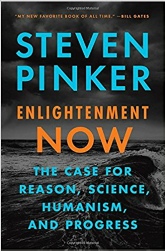




 NEXT
NEXT
 BACK
BACK

Philosophical musings on Quanta & Qualia; Materialism & Spiritualism; Science & Religion; Pragmatism & Idealism, etc.


 Forum
Forum

 Recent Posts
Recent Posts
Enlightenment
for the
21st century
Post 24. March 12, 2018
Re-Enlightenment
Enlightenment ideals for the 21st century
This post is a commentary on a review of Steven Pinker’s new book : Enlightement Now!, The Case For Reason, Science, Humanism, and Progress. My comments follow excerpts from the article. Steven Pinker's Counter-Counter Enlightenment, by Saloni Dattani in Quillette online magazine. She is an Msc student in Behaviour Genetics at the University of London.
http://quillette.com/2018/03/11/steven-pinkers-counter-counter-enlightenment/
Several recent science-oriented magazines have had cover articles on topics such as : The War on Science and Knowledge, Anti-Intellectualism in Today's America [SI Mar/Apr2018]. One culprit in this rejection of Enlightenment values1 is the Post-modern philosophy2, which views history, not as the hopeful record of an upward trend in human development, but as the grim story of an eternal power struggle between Us-vs-Them, Haves-vs-Have-nots, Elites-vs-Commoners, and various other polarized interest groups. Ironically, this atheistic, anti-modern, anti-intellectual, anti-science, anti-progressive movement has some parallels with the goals of Fundamentalist Christians & Muslims. It shares with those theistic religions their dualistic worldview of an ongoing power struggle between Good vs Evil forces. So, it seems that moderate freethinkers may be caught in the crossfire between the Antis on left & right.
Steven Pinker, probably motivated in part by this pessimistic trend in academic & religious circles, has contributed a plethora of reasonable & plausible evidence for a more optimistic outlook. But his story will have a happy ending only if Reason, as a candle in the darkness of the “demon-haunted world”, can be re-lit in a revival of the Enlightenment spirit of progressive human potential. Author Dattani summarizes, “The central theme of Enlightenment Now, to which Pinker returns over & over again, is that progress has been – & will continue to be – possible, provided that we combine reason, science & humanism with our capacity for ingenuity”.3 Pinker is an Atheist, but not an Anti. As a psychologist, he is sympathetic toward our irrational primal urges, motives, and needs.
However, the bastions of pre-scientific worldviews, Politics & Religion, are vigorously defending their turf against the Enlightenment crusaders. They don't know, or don't care, that Pinker is not attacking their ancient redoubts, but merely proposing a new position from which to explore the world beyond the castle walls. A typical critique disdains Pinker’s “smug secular certainties”. But what about the smug religious certainties, that believers call Faith? At least, the Enlightenment beliefs are tested by doubt, before becoming pragmatic verities.
One indication that Pinker is on the right path is that his modest proposal is viciously attacked from both sides : right-wing, faith-based, religious clerics and left-wing, skeptical, secular academics. His critics read his words with a blind eye. As Dattani puts it, “Pinker’s most trenchant critics are eager to flaunt their aversion to the very values Pinker sets out to defend – reason, science, humanism, and progress – and that their critiques display the traits and tics of exactly the kind of counter-Enlightenment thinking he attacks. These counter-enlightenment trends include Catholic, Romantic, and Postmodern modes of thought which stand in opposition to the values that Pinker’s book credits with the vast advances humankind has made since the 18th Century.”
Post 24 continued . . . click Next
1. Age of Enlightenment :
<< The Enlightenment (also known as the Age of Enlightenment or the Age of Reason) was an intellectual and philosophical movement that dominated the world of ideas in Europe during the 18th century, "The Century of Philosophy".
The Enlightenment included a range of ideas centered on reason as the primary source of authority and legitimacy, and came to advance ideals like liberty, progress, tolerance, fraternity, constitutional government and separation of church and state.>>
___Wiki
2. Modernism, Post-Modernism, and Post-postmodernism :
click here for popup
3. Paradigm Shifts :
click here for popup
The Magazine :
<< Quillette is a platform for free thought. We respect ideas, even dangerous ones. We also believe that free expression and the free exchange of ideas help human societies flourish and progress. Quillette aims to provide a platform for this exchange. >>


Steven Pinker
cognitive psychologist, linguist, and
popular science author.
Also author of
The Better Angels
Of Our Nature
Modernism is a philosophical movement that, along with cultural trends and changes, arose from wide-scale and far-reaching transformations in Western society during the late 19th and early 20th centuries. Among the factors that shaped modernism were the development of modern industrial societies and the rapid growth of cities, followed then by reactions of horror to World War I. Modernism also rejected the certainty of Enlightenment thinking, and many modernists rejected religious belief.
https://en.wikipedia.org/wiki/Modernism
Postmodernism seeks to subvert the Enlightenment ideals of progress, justice, centrality of human subjectivity through fragmentation, deconstruction and consumerism. While modernism regards fragmentation as tragic, laments the loss of unity and hopes to regain the lost unity through art, postmodernism celebrates fragmentation and believes that unity and coherence are neither possible nor important.
https://literariness.org/2016/04/03/postmodernisms-critique-of-modernism/
Post-postmodernism is a wide-ranging set of developments in critical theory, philosophy, architecture, art, literature, and culture which are emerging from and reacting to postmodernism. Another similar recent term is metamodernism.
Most scholars would agree that modernism began around 1900 and continued on as the dominant cultural force in the intellectual circles of Western culture well into the mid-twentieth century.[1] Like all eras, modernism encompasses many competing individual directions and is impossible to define as a discrete unity or totality. However, its chief general characteristics are often thought to include an emphasis on "radical aesthetics, technical experimentation, spatial or rhythmic, rather than chronological form, [and] self-conscious reflexiveness"[2] as well as the search for authenticity in human relations, abstraction in art, and utopian striving. These characteristics are normally lacking in postmodernism or are treated as objects of irony.
https://en.wikipedia.org/wiki/Post-postmodernism
Paradigm Shifts :
A fundamental change in worldview and underlying assumptions of a culture. Each social upheaval was caused by general advances in material and/or social conditions. The new attitudes were reflected in academic concepts and public moods [indicated in brackets]. Different paradigms coexist and overlap in time. These are my non-expert opinions & observations.
The regressive Dark Ages followed the fall of the “glorious” Roman Empire, and the decadence of the Roman Church as the centralized authority in Europe. [Cynicism & Uncertainty]
The Renaissance and Enlightenment eras resulted from Freethought, as the philosophical revival of Greek knowledge & attitudes – following the fall of the Eastern half of Catholicism – allowed people to throw-off the yoke of Faith that had bound Europeans to church authority based on divine revelations, controlled by the central bureaucracy. [Curiosity & Rebellion]
Expansive Modernism was a progressive opening-up of societies due to rapid advances in Science & Technology. [Optimism & Certainty]
Withering Existentialism was an emotional re-action to crumbling social foundations due to frag-mentation & decentralization, and head-spinning changes in modern societies. [Pessimism & Anxiety]
Critical Postmodernism was an acceptance of absurdity, and a continuation of the process of under-mining ancient authorities & verities. [Skepticism & Irony]
Pragmatic Post-postmodernism is a course correction to rebuild the philosophical structure of culture-shocked societies. [Reason & Confidence]
Pinker’s book may be the Bible of this 21st century revival of progressive thought and attitudes.






 NEXT
NEXT
 BACK
BACK




 Recent Posts
Recent Posts


